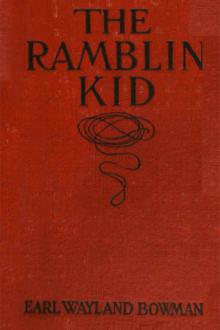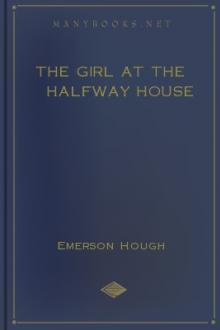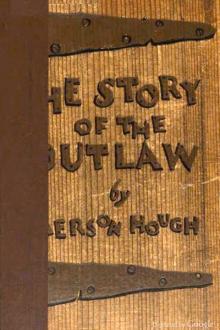The Cross-Cut, Courtney Ryley Cooper [best ereader for manga txt] 📗

- Author: Courtney Ryley Cooper
Book online «The Cross-Cut, Courtney Ryley Cooper [best ereader for manga txt] 📗». Author Courtney Ryley Cooper
Heavy and bulky was this, filled with tax receipts, with plats and blueprints and the reports of surveyors. Here was an assay slip, bearing figures and notations which Robert Fairchild could not understand. Here a receipt for money received, here a vari-colored map with lines and figures and conglomerate designs which Fairchild believed must relate in some manner to the location of a mining camp; all were aged and worn at the edges, giving evidence of having been carried, at some far time of the past, in a wallet. More receipts, more blueprints, then a legal document, sealed and stamped, and bearing the words:
County of Clear Creek, ) ss.
State of Colorado. )
DEED PATENT.
KNOW ALL MEN BY THESE PRESENTS: That on this day of our Lord, February 22, 1892, Thornton W. Fairchild, having presented the necessary affidavits and statements of assessments accomplished in accordance with—
On it trailed in endless legal phraseology, telling in muddled, attorney-like language, the fact that the law had been fulfilled in its requirements, and that the claim for which Thornton Fairchild had worked was rightfully his, forever. A longer statement full of figures, of diagrams and surveyor's calculations which Fairchild could neither decipher nor understand, gave the location, the town site and the property included within the granted rights. It was something for an attorney, such as Beamish, to interpret, and Fairchild reached for the age-yellowed envelope to return the papers to their resting place. But he checked his motion involuntarily and for a moment held the envelope before him, staring at it with wide eyes. Then, as though to free by the stronger light of the window the haunting thing which faced him, he rose and hurried across the room, to better light, only to find it had not been imagination; the words still were before him, a sentence written in faint, faded ink proclaiming the contents to be "Papers relating to the Blue Poppy Mine", and written across this a word in the bolder, harsher strokes of a man under stress of emotion, a word which held the eyes of Robert Fairchild fixed and staring, a word which spelled books of the past and evil threats of the future, the single, ominous word:
"Accursed!"
CHAPTER II
One works quickly when prodded by the pique of curiosity. And in spite of all that omens could foretell, in spite of the dull, gloomy life which had done its best to fashion a matter-of-fact brain for Robert Fairchild, one sentence in that letter had found an echo, had started a pulsating something within him that he never before had known:
"—It is the blood of an adventurer."
And it seemed that Robert Fairchild needed no more than the knowledge to feel the tingle of it; the old house suddenly became stuffy and prison-like as he wandered through it. Within his pocket were two envelopes filled with threats of the future, defying him to advance and fight it out,—whatever it might be. Again and again pounded through his head the fact that only a night of travel intervened between Indianapolis and St. Louis; within twelve hours he could be in the office of Henry Beamish. And then—
A hurried resolution. A hasty packing of a traveling bag and the cashing of a check at the cigar store down on the corner. A wakeful night while the train clattered along upon its journey. Then morning and walking of streets until office hours. At last:
"I 'm Robert Fairchild," he said, as he faced a white-haired, Cupid-faced man in the rather dingy offices of the Princess Building. A slow smile spread over the pudgy features of the genial appearing attorney, and he waved a fat hand toward the office's extra chair.
"Sit down, Son," came casually. "Need n't have announced yourself. I 'd have known you—just like your father, Boy. How is he?" Then his face suddenly sobered. "I 'm afraid your presence is the answer. Am I right?"
Fairchild nodded gravely. The old attorney slowly placed his fat hands together, peaking the fingers, and stared out of the window to the grimy roof and signboards of the next building.
"Perhaps it's better so," he said at last. "We had n't seen each other in ten years—not since I went up to Indianapolis to have my last talk with him. Did he get any cheerier before—he went?"
"No."
"Just the same, huh? Always waiting?"
"Afraid of every step on the veranda, of every knock at the door."
Again the attorney stared out of the window.
"And you?"
"I?" Fairchild leaned forward in his chair. "I don't understand."
"Are you afraid?"
"Of what?"
The lawyer smiled.
"I don't know. Only—" and he leaned forward—"it's just as though I were living my younger days over this morning. It doesn't seem any time at all since your father was sitting just about where you are now, and gad, Boy, how much you look like he looked that morning! The same gray-blue, earnest eyes, the same dark hair, the same strong shoulders, and good, manly chin, the same build—and look of determination about him. The call of adventure was in his blood, and he sat there all enthusiastic, telling me what he intended doing and asking my advice—although he would n't have followed it if I had given it. Back home was a baby and the woman he loved, and out West was sudden wealth, waiting for the right man to come along and find it. Gad!" White-haired old Beamish chuckled with the memory of it. "He almost made me throw over the law business that morning and go out adventuring with him! Then four years later," the tone changed suddenly, "he came back."
"What then?" Fairchild was on the edge of his chair. But Beamish only spread his hands.
"Truthfully, Boy, I don't know. I have guessed—but I won't tell you what. All I know is that your father found what he was looking for and was on the point of achieving his every dream, when something happened. Then three men simply disappeared from the mining camp, announcing that they had failed and were going to hunt new diggings. That was all. One of them was your father—"
"But you said that he 'd found—"
"Silver, running twenty ounces to the ton on an eight-inch vein which gave evidences of being only the beginning of a bonanza! I know, because he had written me that, a month before."
"And he abandoned it?"
"He 'd forgotten what he had written when I saw him again. I did n't question him. I did n't want to—his face told me enough to guess that I would n't learn. He went home then, after giving me enough money to pay the taxes on the mine for the next twenty years, simply as his attorney and without divulging his whereabouts. I did it. Eight years or so later, I saw him in Indianapolis. He gave me more money—enough for eleven or twelve years—"
"And that was ten years ago?" Robert Fairchild's eyes were reminiscent. "I remember—I was only a kid. He sold off everything he had, except the house."
Henry Beamish walked to his safe and fumbled there a moment, to return at last with a few slips of paper.
"Here 's the answer," he said quietly, "the taxes are paid until 1922."
Robert Fairchild studied the receipts carefully—futilely. They told him nothing. The lawyer stood looking down upon him; at last he laid a hand on his shoulder.
"Boy," came quietly, "I know just about what you 're thinking. I 've spent a few hours at the same kind of a job myself, and I 've called old Henry Beamish more kinds of a fool than you can think of for not coming right out flat-footed and making Thornton tell me the whole story. But some way, when I 'd look into those eyes with the fire all dead and ashen within them, and see the lines of an old man in his young face, I—well, I guess I 'm too soft-hearted to make folks suffer. I just couldn't do it!"
"So you can tell me nothing?"
"I 'm afraid that's true—in one way. In another I 'm a fund of information. To-night you and I will go to Indianapolis and probate the will—it's simple enough; I 've had it in my safe for ten years. After that, you become the owner of the Blue Poppy mine, to do with as you choose."
"But—"
The old lawyer chuckled.
"Don't ask my advice, Boy. I have n't any. Your father told me what to do if you decided to try your luck—and silver 's at $1.29. It means a lot of money for anybody who can produce pay ore—unless what he said about the mine pinching out was true."
Again the thrill of a new thing went through Robert Fairchild's veins, something he never had felt until twelve hours before; again the urge for strange places, new scenes, the fire of the hunt after the hidden wealth of silver-seamed hills. Somewhere it lay awaiting him; nor did he even know in what form. Robert Fairchild's life had been a plodding thing of books and accounts, of high desks which as yet had failed to stoop his shoulders, of stuffy offices which had been thwarted so far in their grip at his lung power; the long walk in the morning and the tired trudge homeward at night to save petty carfare for a silent man's pettier luxuries had looked after that. But the recoil had not exerted itself against an office-cramped brain, a dusty ledger-filled life that suddenly felt itself crying out for the free, open country, without hardly knowing what the term meant. Old Beamish caught the light in the eyes, the quick contraction of the hands, and smiled.
"You don't need to tell me, Son," he said slowly. "I can see the symptoms. You 've got the fever—You 're going to work that mine. Perhaps," and he shrugged his shoulders, "it's just as well. But there are certain things to remember."
"Name them."
"Ohadi is thirty-eight miles from Denver. That's your goal. Out there, they 'll tell you how the mine caved in, and how Thornton Fairchild, who had worked it, together with his two men, Harry Harkins, a Cornishman, and 'Sissie' Larsen, a Swede, left town late one night for Cripple Creek—and that they never came back. That's the story they 'll tell you. Agree with it. Tell them that Harkins, as far as you know, went back to Cornwall, and that you have heard vaguely that Larsen later followed the mining game farther out West."
"Is it the truth?"
"How do I know? It 's good enough—people should n't ask questions. Tell nothing more than that—and be careful of your friends. There is one man to watch—if he is still alive. They call him 'Squint' Rodaine, and he may or may not still be there. I don't know—I 'm only sure of the fact that your father hated him, fought him and feared him. The mine tunnel is two miles up Kentucky Gulch and one hundred yards to the right. A surveyor can lead you to the very spot. It's been abandoned now for thirty years. What you 'll find there is more than I can guess. But, Boy," and his hand clenched tight on Robert Fairchild's shoulder, "whatever you do, whatever you run into, whatever friends or enemies you find awaiting you, don't let that light die out of your eyes and don't pull in





Comments (0)